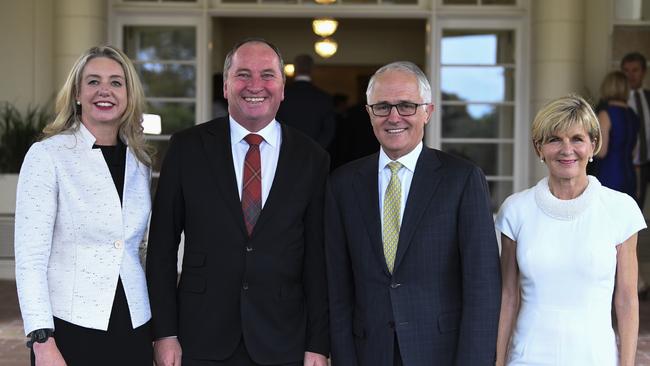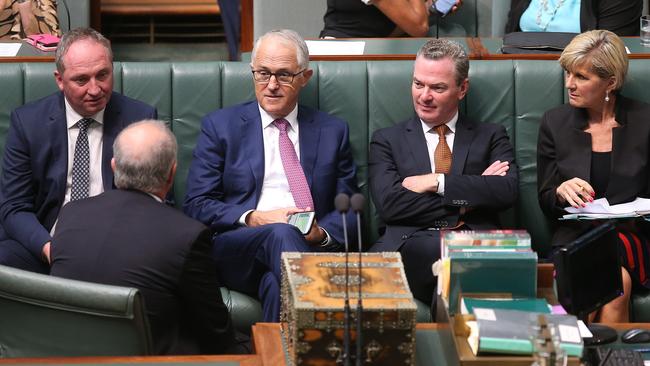
The Barnaby Joyce crisis is a cultural threshold in our politics — it exposes the myth of the authentic outsider, delivers another blow to the decaying fortress of Australian conservatism, affirms the growing progressive quest to regulate human relations and reveals the weakness of the once formidable Nationals.
The consequences of the Joyce crisis will be immense. The centre-right governs at the national level only in coalition. This requires two conditions — an effective Nationals leader and working trust between the two party leaders — and both conditions are in jeopardy. The Turnbull government is threatened at its apex.
Barnaby came into politics as a populist, a maverick and a rebel. He tormented the Howard government by crossing the Senate floor on almost 20 occasions and anybody predicting he was a future Nationals leader would have been dismissed as delusional. Yet it came to pass. His toughness and adaptability had been underestimated. Barnaby the outsider became Joyce the insider and Deputy Prime Minister.
He juggled these dual identities and, for much of the time, it worked — but no longer. The tragedy is Shakespearean because Joyce, once that happy rebel, is now discredited since he succumbed as an insider. The lure is often irresistible. Joyce succumbed to that artificial, toxic yet enticing world of power, the adrenalin of public office, long hours, free travel, staffers, hard drinking and an alternative life in Canberra.
He became an insider and fell as an insider. His career is a reminder about the paradox of appealing to voters as an outsider — once you obtain serious influence you begin the transition to insider status. This is the risk for minor party leaders from Pauline Hanson to Nick Xenophon as they struggle to be outsiders yet powerbrokers. It is surely why Xenophon rejects being South Australian premier.
Joyce’s achievements in a relatively short career are impressive — he represented Queensland as a senator and NSW as a member of the House of Representatives; he is the first person to win a Senate and house seat previously lost to the government; he crushed his rival, Tony Windsor, one of the strongest independents to sit in the parliament; he became the irresistible choice as Nationals leader, survived the dual citizenship crisis last year and won a smashing by-election victory.
Barnaby aspired to unite the party with its populist, protectionist and economic nationalist roots. It was a natural response to the rise of Hansonism and rural grievance. His elevation, however, came in a party being relentlessly weakened as its great figures faded into history. Barnaby was never a ruthless ministerial giant like John McEwen, a born leader like Doug Anthony, a farmer sophisticate like Ian Sinclair, an unorthodox professional like Tim Fischer or an anointed successor like John Anderson. He is a retail and populist politician prone to rash judgments; the Nationals became dependent on Barnaby but also exposed to his flaws.
Now they are traumatised — they fear he is irrevocably damaged yet they fear removing him. They fear their own weakness. They fear the lack of any compelling successor. Joyce, meanwhile, is in denial about the fatal damage his private life has done to his political character, integrity and brand as a values politician. The idea this is a temporary embarrassment is tempting but false. The Nationals almost certainly face a lose-lose scenario. And that means the bigger losers will be the Liberals as their governing partners.
The Newspoll this week showing only 23 per cent of people believe Joyce should remain in parliament as leader is devastating but hardly a shock. A total of 65 per cent want him to resign as leader. This includes 58 per cent among Coalition voters and 56 per cent among One Nation voters.
Malcolm Turnbull last Thursday condemned Joyce’s behaviour and, by asking him to consider his position, made clear he wanted Joyce to resign. The Prime Minister won’t repeat that remark — but it stands, an unprecedented comment by a Liberal PM about a Nationals deputy PM.

Joyce had another status — as a populist conservative. The two highest ranking and highest profile conservatives since the 2013 election have been Tony Abbott and Joyce — yet Abbott was dumped by his party and is consigned to the backbench, and Joyce is now politically crippled whether he is dumped or not. This is an insight into the crisis of Australian conservatism. Where are its leaders? Where is its moral force? What happened to its institutional authority?
Conservatives these days excel at drum-beating, making a lot of noise, writing a lot of articles and losing every substantial battle. They are fragmented, intellectually confused and strategically inept. Much of the nation is still conservative in its instincts but this constituency is denied inspiring or effective leadership.
Conservatives lost the issue of same-sex marriage. They are likely to lose the issue of religious freedom. They are losing the battle over legalising euthanasia. On almost every front from climate change to coal to gender politics to Western civilisation heritage, they are on the defensive.
In this context the demise of Joyce testifies to the conservative plight. Conservatives champion family values yet fail as exemplars, inviting the accusation of hypocrisy. They defend tradition at a time when tradition is being destroyed. Embarrassed by their personal failures they try to keep them secret, only to intensify the damage when the truth is revealed. This shatters the trust between the politician and the public but has a deeper generic impact — it shatters public fidelity to the conservative mantra.
In the absence of conservative leadership — and with Turnbull a declared progressive — the political risk deepens for the Liberal and National parties.
How do they retain the support of conservative voters? How do they manage the fragmentation represented by Hanson and, to a lesser extent, by Cory Bernardi’s Australian Conservatives? The emergence of Donald Trump sharpens this dilemma because he splinters conservative opinion into camps fighting over whether he is saviour or demon. Turnbull’s ban on ministers having sexual relations with their staff formalises what should be the case anyway. Yet it also mirrors a far bigger cultural revolution — the private life is now being increasingly subjected to new public norms. In companies, universities and government, this directional shift takes different forms but is unmistakable — personal discretion and liberty are being compromised in the name of identity rights and respect. This is a progressive, not a conservative, movement. It means libertarianism is being sacrificed to identity justice, a process catching many people out. It assumes people cannot be allowed to pursue relationships freely because of the risk of exploitation on the basis of power or gender. The progressive quest is for new rules and regulations to govern human relations.
This is not just about halting sexual abuse or harassment, an essential goal. The progressive vanguard has moved far beyond this — it is now focused on power and argues that consensual sexual relations based on a power imbalance are suspect on grounds of exploitation. Just think about that crazy idea.
It is one thing for Turnbull to justifiably take a stand and say ministers cannot have sex with their own staff. But there is a more momentous cultural shift under way, fed by the cult of victimisation, to impose even more rules on human sexual behaviour in the name of halting the supposedly limitless abuses of power that plague us daily.






